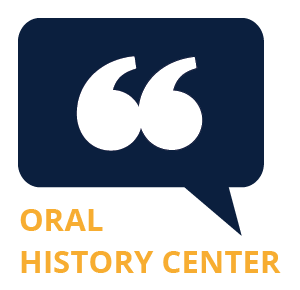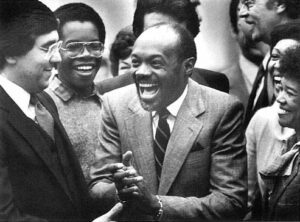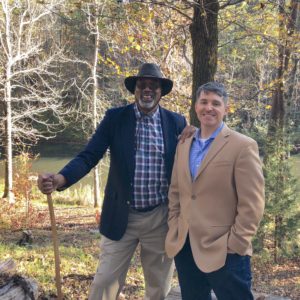Tag: year in review
Oral History Center Staff’s Top Moments of 2020
The year 2020 has been challenging and tumultuous. However, there have been bright spots as the Oral History Center transitioned to working remotely and conducting interviews over Zoom. We wanted to take a moment to reflect on what has brought us joy and given us strength as we leave 2020 behind.

Amanda Tewes, Interviewer/Historian:
This year has certainly created many challenges for me—as an interviewer and as a person—but I’ve been pleasantly surprised by the resiliency and creativity of my colleagues and the field of oral history as a whole. For example, Roger Eardley-Pryor and I worked with UC Berkeley undergraduate Miranda Jiang from 2019 through summer 2020. Miranda spent months researching and writing an original oral history performance for our 2020 Commencement, only to find that the pandemic had eliminated the potential for an in-person event. After regrouping, Miranda spent part of the summer transforming this performance intended for a live audience to a podcast episode on The Berkeley Remix (“Rice All the Time?”) complete with music and sound effects. This was not her original vision for the oral history performance, but she embraced the new media and its potential for reaching wider audiences, and is now working on an article about the challenges and benefits of this transition. We couldn’t be prouder!
Paul Burnett, Interviewer/Historian:
As a consequence of our adjustments to the COVID-19 pandemic, I realized more than ever that we all need to be better informed about the nature of epidemics and the social patterns that are revealed and exacerbated by them. With the help of our communications manager Jill Schlessinger and UDAR students Nika Esmailizadeh, Esther Khan, Corina Chen and Samantha Ready, we published curriculum content and frameworks for grade 11 students on epidemics in history. This curriculum makes use of our collection of interviews with those who confronted the AIDS epidemic in the early 1980s, along with our podcast on this subject. We are fundraising for a second round of interviews on the globalization of the HIV/AIDS pandemic, as well as a new project to develop curriculum materials on California communities and the environment based on our large collection of oral histories. Our collection is a fantastic resource for teachers, but we will continue to curate our content to make it easier to use in the classroom.
Roger Eardley-Pryor, Interviewer/Historian:
With silver bells ringing this holiday season, we search for silver linings amid the turmoil of 2020. My family’s continued health and safety remains that for which I’m most grateful, and both remain atop of our holiday wish list for you and yours. I’m also grateful and privileged to continue working at UC Berkeley’s Oral History Center (OHC). In the spring of 2018, when I began work at the OHC, my daughter was just 4 months old. This December of 2020, she turns three. Back in March of 2020, with heightened fear of the spreading pandemic and just as the Bay Area’s shelter-in-place orders came down, I corresponded with Dr. Samuel Barondes, a medically trained scientist at the University of California San Francisco (UCSF) whose research bridged the fields of psychiatry and molecular neuroscience. Sheepishly, I told Sam my transition to working from home in a tiny one-bedroom apartment, which I shared with my wife and our rambunctious two-year old, would delay my work on his oral history that we recorded the prior year. Sam, now in his eighth decade of vibrant life, remembered well living in a one-bedroom apartment in New York City with his own high-energy two-year-old. Ever the optimist and exuding compassion, Sam told me, “Someday, you’ll treasure these memories of this momentous time…As always, everything is an opportunity!” At that time, I had a hard time hearing Sam’s wisdom. Now, having survived 2020, I understand. Nothing was easy this past year, but, already, I cherish my many months at home working while also watching our young daughter learn and grow. And, despite the past year’s chaos, I’m pleased to have finally published my lengthy oral history interviews with Alexis T. Bell, a professor in the Department of Chemical and Biomolecular Engineering in UC Berkeley’s College of Chemistry; with Michael Schilling, a chemist and head of Materials Characterization at the Getty Conservation Institute (GCI) in Los Angeles; and with Aaron Mair, a pioneer of environmental justice and the first Black president of the Sierra Club. In the coming year, I look forward to COVID vaccines, a new US President, and to completing additional oral histories long delayed by the pandemic, including Dr. Sam Barondes’s. I miss the intimacy and comradery of in-person meetings, of handshakes and hugs, of shared stories and raw laughter reverberating in a room, not filtered through a silicon chip. I hope to see you on the other side of this pandemic. From my family to all of yours, we wish you a happy, safe, and healthy holiday season, and may you know peace and justice in the new year.

Jill Schlessinger, Communications Manager/Managing Editor:
There were many highlights this year in the areas of communications, oral history production, and process. It’s wonderful to work with my team of student editors, Ashley Sangyou Kim, JD Mireles, Jordan Harris, Lauren Sheehan-Clark, and Ricky Noel; communications assistant Katherine Chen, and research assistant Deborah Qu, and I want to thank them for their high-quality work and professionalism. The editorial team wrote discursive tables of contents and edited frontmatter and interviews for dozens of oral histories this year, among other projects. We contributed to the Berkeley Women 150 celebrations, including a collection guide to 225 oral histories with UC Berkeley women — alumnae, faculty, staff, administrators, and philanthropists; a Berkeley women oral history web page, and four articles highlighting the achievements of Berkeley women by our undergraduate research assistant Deborah Qu, about alumnae Janet Daijogo and Ida Louise Jackson, faculty Natalie Zemon Davis and Elizabeth Malozemoff, and Berkeley’s first dean of women, Lucy Sprague Mitchell. I launched a new project management tool to track our complex production process, with more than 100 steps, and our many other initiatives, making collaboration and tracking easier. The Smithsonian Magazine, KPIX-CBS, NPR, East Bay Yesterday podcast, the San Francisco Chronicle, and the movie, Crip Camp, winner of the Audience Prize for documentary at the Sundance Film Festival, among others, featured our oral histories or interviews with our historians/interviewers. A personal highlight for me was writing the article “Never Forget? UC Berkeley’s Oral History Center documents memories of the Holocaust for researchers and the public,” in observance of the 75th anniversary of the liberation of Auschwitz.
Todd Holmes, Interview/Historian:
One of my fondest memories this year at the OHC was our Advanced Summer Institute. Each year we host over 50 participants during this week-long event, teaching the ins and outs of oral history and helping the wide-range of attendees in developing their individual projects. Like so many activities on the Berkeley campus, however, Covid-19 forced us to come up with a safer alternative. Thanks to Shanna Farrell—the office’s longtime Advanced Summer Institute coordinator—we held the institute via Zoom with minimal bumps along the road, allowing us to connect with participants from around the world. Indeed, it was not uncommon to have participants from 3 or 4 different time zones in one meeting. It was an amazing experience, one that highlighted our interconnectedness, as well as what can be achieved with technology and teamwork.
Shanna Farrell, Interview/Historian:
This year has been a doozy. When the shelter-in-place order hit in March, we had to re-learn how to structure our days and focus on work while the world crumbled around us. Many of our projects paused while we collectively tried to regroup and design a path forward. To call this difficult, especially while constantly refreshing my newsfeed, is an understatement. So, I turned to one of my great loves: audio. We launched a series of special episodes of our podcast, The Berkeley Remix, called “Coronavirus Relief.” The intention was to bring stories from the field of oral history, things that had been on our mind, lessons from the past, and interviews that helped us get through, to find small moments of happiness. I served as the producer and editor of these episodes, even writing my own episodes, and worked with Amanda Tewes and Roger Eardley-Pryor, proving that remote collaboration was still possible. Making these seven episodes of The Berkeley Remix was one of my favorite parts of 2020, as it allowed me stay connected to my colleagues, gave me space to think about the value of oral history, and engage our audience during dark days.

Martin Meeker, Director:
Before joining the Oral History Center in 2003 as a postdoc, I had already read the Center’s interview with Willie Brown about his years as Speaker of the California Assembly. I held this up as the pinnacle of political oral history and resolved that one day I would conduct a follow-up and ask him about his two terms as San Francisco Mayor. In 2015 and 2016 the opportunity arose and I conducted a 10 hour oral history with Mayor Brown and I was thrilled with the results. And, finally, in 2020 the mayor gave his blessing for us to release this second volume of what is now a thorough and fascinating life history.

The Oral History Center Year in Review: Our Favorite Interview Moments
The Oral History Center has had a productive year, and interviewed many people. Here’s some of our favorite moments from our 2018 interviews. We hope you enjoy them as much as we did!
Martin Meeker:
Of the dozens of revelatory, challenging, or even hilarious moments in my interviews this year, I find it difficult to highlight just one. But I keep coming back to this moment in my interview with famed ACLU attorney Marshall Krause. Krause defended a number of individuals charged with obscenity in San Francisco in the 1960s, including Vorpal Gallery owner Muldoon Elder for putting Ron Boise’s erotic Kama Sutra sculptures on display. While recounting the story, Krause mentioned that he had one of the artworks in question, so I asked him to bring it out to show on camera. I then asked him to provide the kind of defense he did in the courtroom in 1964. Krause’s sensitive, insightful, convincing words made it obvious why the jury acquitted Elder of the charges, thus giving Krause and the cause of the freedom of expression a victory.
Amanda Tewes:
My favorite interview moment of 2018 occurred when I interviewed Bay Area herbalist and aromatherapist Jeanne Rose. In the 1960s, Rose was the couturier for bands like Jefferson Airplane and was very plugged into the local rock and roll scene. During one of our sessions together, Rose recounted her experience at the Altamont Speedway Free Festival on December 6, 1969, when an agitated audience of about 300,000 erupted into violence. Rose watched the chaos from above the crowd, but still recalls the strong emotions from that day. Hearing about the event firsthand reinforced how scary and chaotic the events must have been for concert goers. Interestingly, Rose marked this concert as “the end” of rock and roll.
Paul Burnett:
had started an underground called the Werewolves. We spent quite a bit of
time on that for the first few months. I don’t think we ever found any. We
once raided an outfit that were presumably Werewolves. I don’t remember
what happened to them, except that we sort of used movie techniques to make
the raid, coming through the skylights.
Todd Holmes:
My favorite moment this year was interviewing Professor James C. Scott at his farm in Durham, Connecticut. The Sterling Professor of Political Science and Anthropology at Yale University, Scott is widely regarded as one of the most influential thinkers of our time, producing an unparalleled corpus of books over the last 50 years on peasant politics, resistance, and state governance, which today are standard reading across a host of disciplines worldwide. Yet in the interviews, we get a glimpse of the unassuming human being behind the books as Scott discusses the two principles that have always underpinned his approach to academic work – principles he stresses . The first: “Don’t ever be afraid to be an army of one in a crowd of a hundred,” a philosophy of independence he came to embrace during his Quaker education as a young man. The second: “If you’re not having fun, what the hell are you doing?” For those who know Jim Scott, the latter is certainly an oft-quoted remark he has extolled to colleagues and graduate students for decades. Spending the weekend at his farm, I quickly realized that those principles were not just lofty ideals, but words he lived by, and I would be wise to do the same.
Shanna Farrell:
My favorite moment this year was during an interview with WWII Veteran Lawson Sakai, who is in his nineties, for the East Bay Regional Park Parkland Oral History Project. Sakai’s parent immigrated from Japan, making him Nisei, or second generation. He spoke about needing to flee California to avoid internment, and the role that farming in the Central Valley played to rebuild the Japanese community in the aftermath. Driscoll Farms was just getting started and needed help growing strawberries. They recruited Japanese farmers, asked them to farm the land, and split profits with them 50/50. After hearing how Driscoll helped many people get back on their feet after losing everything in the wake of Executive Order 9066, I scoured my food history books and didn’t find any information about this. I felt like I had stumbled upon a hidden historical gem.
Roger Eardley-Pryor:
Interviewing Aaron Mair—the 57th president of the Sierra Club and the Club’s first African-American president—provided my favorite interview moments this year. We conducted Aaron’s initial interview session at the Hagood Mill Historic Site in the upcountry of South Carolina. As his family’s genealogist, Aaron has the 1865 records of his enslaved great, great grandfather Zion McKenzie’s emancipation from the Hagood family. Before interviewing at the Hagood Mill site, Aaron and I visited the humble, un-fenced cemetery of his enslaved ancestors, whose rough, uncut gravestones lay just outside the Hagood family’s iron-fenced grave site with grandiose tombs and Confederate soldier crosses. Later, during his interview, Aaron recounted his ancestors’ remarkable stories from slavery to freedom and their purchase of farm land that remains in Aaron’s family today. His family’s narrative, from human dominion to sustainable stewardship of land, informs Aaron’s ideas on environmental responsibility. And it helped inspire Aaron’s initiatives as Sierra Club president to unify activism for environmental rights with civil rights and labor rights. Aaron takes seriously Sierra Club founder John Muir’s admonition that “When we try to pick out anything by itself, we find it hitched to everything else in the Universe.”

Mair and Eardley-Pryor